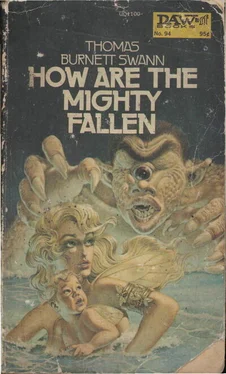Thomas Swann - How are the Mighty fallen
Здесь есть возможность читать онлайн «Thomas Swann - How are the Mighty fallen» весь текст электронной книги совершенно бесплатно (целиком полную версию без сокращений). В некоторых случаях можно слушать аудио, скачать через торрент в формате fb2 и присутствует краткое содержание. Жанр: Фэнтези, на английском языке. Описание произведения, (предисловие) а так же отзывы посетителей доступны на портале библиотеки ЛибКат.
- Название:How are the Mighty fallen
- Автор:
- Жанр:
- Год:неизвестен
- ISBN:нет данных
- Рейтинг книги:4 / 5. Голосов: 1
-
Избранное:Добавить в избранное
- Отзывы:
-
Ваша оценка:
- 80
- 1
- 2
- 3
- 4
- 5
How are the Mighty fallen: краткое содержание, описание и аннотация
Предлагаем к чтению аннотацию, описание, краткое содержание или предисловие (зависит от того, что написал сам автор книги «How are the Mighty fallen»). Если вы не нашли необходимую информацию о книге — напишите в комментариях, мы постараемся отыскать её.
How are the Mighty fallen — читать онлайн бесплатно полную книгу (весь текст) целиком
Ниже представлен текст книги, разбитый по страницам. Система сохранения места последней прочитанной страницы, позволяет с удобством читать онлайн бесплатно книгу «How are the Mighty fallen», без необходимости каждый раз заново искать на чём Вы остановились. Поставьте закладку, и сможете в любой момент перейти на страницу, на которой закончили чтение.
Интервал:
Закладка:
“I’ve heard he’s twelve feet tall-”
“Nine.”
“With legs like pillars in the temple Samson toppled.”
“More like roof beams.”
“And one big eye in the middle of his forehead.”
“True enough.”
“How is your tooth, Elihu?”
“Hurts like Sheol.”
Then, with neither thanks nor leavetaking, Elihu, Ozem, and Nethanel departed to play knucklebones with their friends.
David did not intend to waste his visit to the camp by sitting on a pile of cloaks. Concluding that no one would care to steal such disreputable and odorous garments, he wandered among the men, carrying his lyre, his rarest possession, and explored the camp: the black sheepskin tents of Saul, Jonathan, Riapah, and Abner; the roofless encampments of the foot soldiers. In Israel, every able-bodied man was a soldier during the Philistine invasions, but the rest of the time he was a farmer, a shepherd, or an artisan. There were few Israelite merchants; commerce was left to the sea-roving Phoenicians or the desert-striding, camel-riding Bedouins, who numbered among them the Midianites and other tribes.
“Get you home, son,” said a man with a white streak meandering through his black hair like a rivulet through a desert. He had the keen eyes of a shepherd and the air of a man who is his own best company. He looked as if he would like to be tending sheep on the slopes of Mt. Hebron. “The battle promises to go against us, and they threaten to split our forces in the hills of Ephraim and the Judah Valley. Three thousand chariots, our scouts report! And nobody knows how many foot soldiers. You know how the Philistines fight.” (Indeed, he knew how the Philistines fought; he had memorized every detail of every battle since the days of Joshua and Jericho.)
“But you have Jonathan,” he said. Saul was a tolerable king, but he was aging and gray and given to moods which approached madness. Abner, the king’s cousin, was a great general, but he was nearly as old as Saul, that is to say fifty. It was going to be Jonathan’s battle. Three thousand chariots? Thus had Jonathan chosen a rocky terrain where the axles would crack on the rocks and the knives affixed to the wheels would blunt themselves on bindweed or thorny broom.
“Ah, what can a boy do against a giant like Goliath?”
“But Jonathan is not a boy!” (At twenty! Why, he was a mature young man and the captain of a thousand men! Old men liked to speak of anyone younger than themselves as “boys.”) “And I hear Goliath isn’t with the Philistines,” said David. “And his brothers”-for Goliath belonged to the family known as the Giants of Gath-“won’t fight without him.”
“That’s true. Even giants are subject to the demons of fever, and when one of them is sick, the others panic and refuse to leave their tents. But the Philistine necromancers will doubtless exorcise the demons and he will be right out there with the chariots. If not in this battle, then the next.” (There was always a next battle. It seemed to David that Israel was engaged not in many little wars as the scribes recorded on their scrolls of parchment, but in a large and continuous war which moved from place to place and changed its name but not its, nature. It was much the same if they were fighting the Philistines or the Edomites or the Moabites. They fought to unite the Twelve Tribes of Israel, to secure the caravan routes which passed through their territory, and to gain access to the sea. Now if he were king…)
“It will take more than Jonathan, Yahweh help the boy, to save us.”
David withdrew as courteously as possible from this uncongenial conversation. He did not like to hear his hero regarded as less than heroic. He found a smooth black stone for a seat-perhaps it had once been an altar, though the Egyptians used such stones to make iron-and began to compose a psalm about Jonathan meeting a lion. He drew upon his own experience, but he made Jonathan’s beast a great ravening brute with yellow teeth and slavering jaws; a worthy foe for a great hero; and ended by becoming so enthralled with his tale, which was both martial and bloodthirsty, that he failed to notice the small crowd which had gathered around him. When he finished his psalm-still unpolished, of course — there was uninhibited applause from a dozen listeners. Israelites loved music. They entered a battle to the blast of a ram’s horn; they had toppled the walls of Jericho with trumpet blasts; they danced ecstatic dances to flutes when the spirit of Yahweh descended upon them; and those who forgot their own religion often participated in the fertility rites of the Canaanites-the people who had ruled the country before the explosive arrival of the Israelites-and danced until the fever in their blood drove them to lie with strange women or, a particular abomination in Yahweh’s eyes, with beardless youths as pretty as girls.
The next man who approached David was entirely gray, but he did not seem any particular age, even to a youth of seventeen. He seemed somehow beyond age, disease, death. He stood as straight as a shepherd’s staff and his eyes were clear and blue and penetrating and his tunic was spotless and neatly spun of Egyptian flax. At first David mistook him for Saul, whom he had never seen close at hand (he never saw anybody important in Bethlehem).
Instinctively he fell to his knees. The man smiled; it was a kindly smile. There was a sadness about him, as if he had loved the wrong woman; David imagined him being scorned by a haughty Egyptian princess and sorrowing for her until he died. It did not occur to him that the man might simply be a farmer-turned-soldier like Saul who hated to kill.
“Stand up, boy. I’m not Saul, I’m Abner, the king’s cousin. But I’ve come from Saul, who would like to hear you play. He caught some snatches of your song-something about a lion, was it? — and he wished for more.”
“But I’m only a shepherd,” David cried. “How can I play for a king?”
“You are a shepherd, it may be, but you are also a musician with a rare gift. The king is-how shall I say? — troubled. You might ease his spirit.‘
David was, distinctly disappointed with Saul’s tent Somehow he had expected to find that the black sheepskin walls concealed the riches of an Egyptian palace, with naked temptresses languishing on marble couches, and a soft fountain spraying the air with myrrh, and trophies of battle, a human head on a stake, perhaps, beside the door. But it was, after all, only a warrior’s tent and one which was furnished with a sparseness amounting to asceticism. A tired old man, clad in a gray robe without adornments, reclined on a wooden couch with no cushions, and a woman, painted but not provocative, bovine in fact, lounged at his feet. Saul’s wife, of course, was neither in the camp nor in the tent Since Rizpah had replaced her in Saul’s affections, she had remained in the town of Gibeah, the capital, revered by her people even while she was rejected by her husband. At David’s entrance, Saul lifted his head and said, both lucidly and kindly, “You’re the young musician I heard. Will you play for me?” Then his head, with its sharp pointed beard, sank onto his chest and cobwebs seemed to pass over his eyes. He looked like a man exhausted with fever.
David looked at Abner. “What shall I play, my lord?”
“You may dispense with the ‘lord,’” Abner said. “Play something about Yahweh and his forgiveness. The king has great fear of his god.”
“Play something about Yahweh,” Rizpah echoed, with the look of a ruminating cow. “Saul feels he has disappointed his god. He has not been harsh enough toward the enemies of Israel.”
David and the entire country knew that when Saul was bidden by Samuel to smite the Amalekites and spare neither man nor woman nor child, he spared King Agag and it remained for Samuel to execute the Lord’s command.
Читать дальшеИнтервал:
Закладка:
Похожие книги на «How are the Mighty fallen»
Представляем Вашему вниманию похожие книги на «How are the Mighty fallen» списком для выбора. Мы отобрали схожую по названию и смыслу литературу в надежде предоставить читателям больше вариантов отыскать новые, интересные, ещё непрочитанные произведения.
Обсуждение, отзывы о книге «How are the Mighty fallen» и просто собственные мнения читателей. Оставьте ваши комментарии, напишите, что Вы думаете о произведении, его смысле или главных героях. Укажите что конкретно понравилось, а что нет, и почему Вы так считаете.












